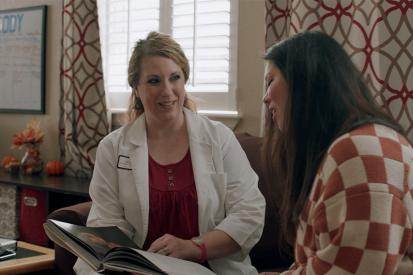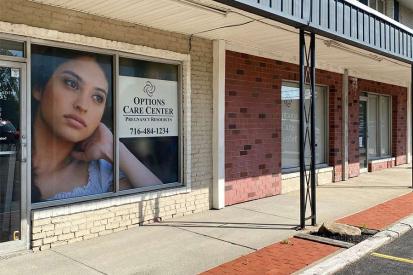The CARE Act: Protecting the Ability of Pregnancy Centers to Care for Women


As the executive director of a pro-life pregnancy center in Sacramento, California, Heidi Matzke should be able to focus on providing much-needed care for pregnant women, new mothers, and their families. But after the U.S. Supreme Court overturned Roe v. Wade in the summer of 2022, she was forced to dedicate much of her attention to protecting her pregnancy center and employees from targeted attacks.
“We have been forced to hire 24-hour on-site security,” Matzke testified at a U.S. Senate Judiciary Committee hearing in July 2022. “We’ve had to reinforce doors and bulletproof our walls. We’ve had to paint our building with anti-graffiti coating. We’ve added cameras, armed our staff with pepper spray, and stopped running our mobile clinic because of threats of violence.”
Matzke even recounted the story of a man armed with a machete approaching the pregnancy center 45 minutes before it was supposed to open on July 8, 2022. She said it was only by “God’s grace” that the man ran off after he was confronted by the pregnancy center’s security guard.
Unfortunately, Heidi Matzke’s story is not an isolated one. Over 100 pregnancy centers, churches, and other pro-life organizations were attacked in the six months following the leaked Supreme Court opinion in Dobbs v. Jackson Women’s Health Organization, and those attacks have only continued.
These violent attacks have been fueled, in part, by lies spread about pro-life pregnancy centers. But it’s not just physical attacks that are threatening them.
Lawmakers across the country have passed measures to censor, unlawfully investigate, and otherwise punish pregnancy centers simply because they do not promote abortion. Since the Dobbs decision, 18 states have introduced measures targeting these organizations.
California, Colorado, Illinois, and Vermont have passed anti-pregnancy center legislation, and another bill passed the Delaware legislature earlier this summer. This is why the [Pregnancy] Center Autonomy and Rights of Expression (CARE) Act is so important.
What is the CARE Act?
The CARE Act is a bill designed to protect the life-affirming mission and work of pregnancy centers. It ensures that government officials cannot discriminate against pregnancy centers because they disagree with the organizations’ pro-life views. And it prohibits government officials from censoring the free speech of pregnancy centers or forcing them to express messages they disagree with.
The CARE Act has not yet been introduced in state legislatures, but when it is, it has the potential to protect pro-life pregnancy centers from many of the threats they face today.
How are pregnancy centers being threatened?
In addition to the physical threats mentioned above, pro-life pregnancy centers in states across the country have been targeted by lawmakers because of their pro-life beliefs. Below are some types of threats that pregnancy centers have recently faced.
Laws censoring pregnancy centers’ speech
Government officials in multiple states are attempting to censor the speech of pregnancy centers, especially as it relates to abortion pill reversal (APR). APR uses the hormone progesterone to try to reverse the effects of mifepristone in women who have changed their minds about having a chemical abortion. While APR is not guaranteed to reverse the effects of abortion drugs, research shows it has a 64-68 percent success rate, and statistics indicate it has likely saved the lives of over 5,000 unborn children.
Rather than allowing pregnancy centers to tell women about this option, New York Attorney General Letitia James filed lawsuits against 11 of these centers in an attempt to censor them from speaking about APR. Alliance Defending Freedom is representing the National Institute for Family and Life Advocates (NIFLA) and two pro-life pregnancy centers in a lawsuit challenging James’s discrimination.
In Colorado, government officials passed a law banning medical professionals from offering APR or even explaining the option to women. ADF has intervened in a lawsuit challenging the unconstitutional law on behalf of a pro-life nurse.

A different flavor of censorship is occurring in Vermont, where state law places immense restrictions on the ability of pregnancy centers to advertise their services and to provide information, counseling, and other services to women. And the law specifically targets pro-life centers, applying only to facilities that do not perform or refer for abortions.
ADF has filed suit to challenge the law, representing NIFLA and two of the group’s pregnancy centers. By painting a target for litigation on pregnancy centers, laws like Vermont’s only make it harder for women to know all their options and get the support they need.
Laws compelling pregnancy centers’ speech
In addition to censoring speech, some states are trying to force pro-life medical professionals and pregnancy centers to speak messages that violate their beliefs. An Illinois law signed by the governor in 2016 says that regardless of moral objections, pro-life doctors and pregnancy centers must tell women about the so-called “benefits” of abortion and refer them to an abortion provider upon request.
ADF attorneys challenged the law in both state and federal courts, and while both courts temporarily halted enforcement of the law, neither has issued a final decision.
Previously, ADF won a landmark victory in 2018 when the U.S. Supreme Court struck down a California law requiring pro-life pregnancy centers to provide free advertising for the abortion industry. The same logic should be applied to strike down the unconstitutional law in Illinois.
Unlawful investigations of pregnancy centers
New Jersey Attorney General Matthew Platkin doesn’t have the power to pass laws targeting pro-life pregnancy centers, but that didn’t stop him from taking matters into his own hands. Without citing any evidence of wrongdoing or complaints, he issued a subpoena demanding First Choice Women’s Resource Centers turn over the identities of half of its donors, the identities of its personnel, copies of every First Choice solicitation and advertisement, and information related to outside organizations it works with.
Attorney General Platkin has been outspoken about his hostility toward groups that do not support abortion—in fact, he even asked Planned Parenthood for help to draft his “consumer alert” against pregnancy centers. And his subpoena was a clear example of discrimination against First Choice because of its pro-life views. ADF filed a lawsuit challenging AG Platkin’s unlawful demands.
A similar situation played out in Washington, where Attorney General Bob Ferguson targeted a network of pro-life pregnancy centers in his state with similar unfounded investigations. After ADF filed a lawsuit, the attorney general officially closed the investigation and stated that he would not file litigation against the network.
Interference in pro-life pregnancy centers’ hiring practices
In New York, Attorney General James’s lawsuits have not been the only attacks against the state’s pregnancy centers. In 2019, the state legislature passed a law prohibiting employers from hiring or firing people based on their “reproductive choices.”
The law also bars all employers from having their employees “sign a waiver or other document which purports to deny an employee the right to make their own reproductive health care decisions, including use of a particular drug, device, or medical service.” In other words, pro-life organizations, including pregnancy centers and churches, could be forced to hire people who expressly violate their pro-life missions.
To top it all off, the law requires employers to praise these requirements by characterizing them as protections of “employee rights” in their handbooks.

ADF attorneys filed a lawsuit challenging the law on behalf of NIFLA and two individual pregnancy centers. A federal district court struck down the portion of the law requiring employers to praise the government’s requirements, but it left the rest of the law in place. So we appealed to the U.S. Court of Appeals for the 2nd Circuit, where the case is currently awaiting a ruling.
The CARE Act would protect pregnancy centers
While ADF stands ready to defend pro-life pregnancy centers from threats like the ones mentioned above, these organizations shouldn’t be forced to endure time-consuming litigation just to defend their basic rights.
The CARE Act includes multiple provisions that would protect pro-life pregnancy centers from targeted harassment and attacks. As designed, the CARE Act will:
- Prohibit state and local officials from passing laws or adopting regulations or other measures forcing pro-life pregnancy centers to provide surgical or chemical abortions.
- Prohibit officials from requiring pro-life pregnancy centers to refer for abortion, counsel in favor of abortion, or otherwise advertise for the killing of unborn children.
- Make it unlawful for officials to prohibit pregnancy centers from offering counseling, classes, or other services related to childbirth because the centers do not perform or refer for abortions.
- Ensure that officials cannot force pro-life pregnancy centers to hire or continue to employ people who do not agree with their pro-life mission.
Some cities have circumvented state legal systems by passing municipal measures targeting pregnancy centers. In 2022, cities including Baltimore, New York City, Pittsburgh, and Seattle all passed measures targeting pregnancy centers even though their states had no such laws.
The CARE Act is meant to pre-empt these discriminatory municipal ordinances, ensuring that states have the power to protect pregnancy centers and allow them to continue their important work.
Pro-life pregnancy centers provide hundreds of millions of dollars in goods and services to women and families in need each year, and they deserve the ability to serve people without being targeted for their beliefs. The CARE Act would ensure that these pregnancy centers can continue their important work for their communities.

